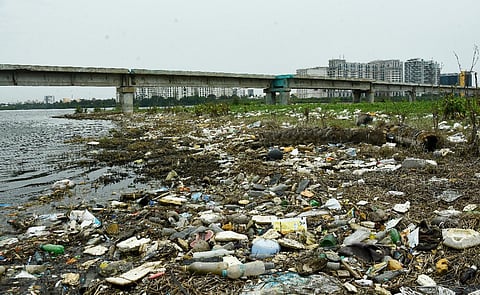

CHENNAI: Tonnes of plastic waste is piling-up near river mouths in Chennai posing serious threat to aquatic life. With the entire state government machinery busy with the containment of coronavirus spread,
there isn't proper clean-up leading to the crisis-like situation.
A visit to the broken bridge area near Adyar Estuary will tell you how grave the situation is. A large portion of the estuary surface and its river bed is covered by plastic debris waiting to make their way into
the sea.
Pet bottles, parcel containers, wrappers, plastic bags, disposed face masks and gloves are found at the river bed. The situation is equally bad near the Cooum river mouth and Kovalam river mouth.
A city-based artist, B Gowtham, a young eco-warrior who created a majestic whale lying on the sands of Besant Nagar Beach using thrown away plastic bottle caps, said: "I feel the per-capita consumption of
plastics has increased during the lockdown with people preferring to order online lot more food and groceries. The parcel material that is used consists of mostly plastic, which is adding to the problem."
Gowtham, who designed corona helmets and autos for traffic police to spread awareness, said the general public needs to act responsibly. "Taking special permission, I undertake 'Walk for Plastic' daily in my
locality and collect approximately 250 pieces of plastic and 40 per cent of the waste is discarded face masks. This is an irresponsible behavior. I find many morning joggers simply littering the pet bottles
on the road. The city corporation personnel are all busy with Covid-19 works and we can't expect them to carry out clean-up during the pandemic," he said.
Joe K Kizhakudan, officer-in-charge, Kovalam Field Laboratory, Central Marine Research Institute (CMFRI), said this is a recurring problem. "Once the monsoon rains begin, all the accumulated plastic waste in the river mouths will enter the ocean. Plastic wreaks havoc on marine ecosystems. As plastic swirls around in the water, much of it breaks down to tiny pieces called microplastics and is consumed by fish species," he said.
The New India Express has reported recently on how unscientific disposal of face masks and gloves not only pose potential health risk during the pandemic but also contain materials that do not recycle and
are not biodegradable. Surgical masks for instance are made of non-woven fabrics including plastics like polypropylene.